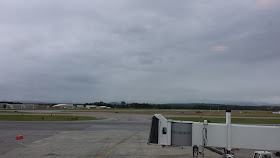The weather this year has been abnormally cold. It began during the winter in Marathon. I complained about it here on this blog.
It continued when Libby and I wanted to go camping in the mid-Atlantic states on our way north. The cold weather defeated us and caused us to cancel our plans.
After arriving in Vermont, I thought that we were past the cold spring. We had some nice days, and May 20 (the day of Sara's wedding) was lovely. But since then it has turned cold again.
I in particular am eager to take our canoe out to Valcour Island. But the weather has been so cold and the lake so rough that we can't. (I hope to try again next weekend)
But before leaping to the conclusion that all of this is due to Global Cooling ;-), I heard a very interesting story on Vermont Public Radio, about 1816 in Vermont. You can listen to the recording here http://digital.vpr.net/post/1816-year-without-summer, or read about it here The Summer(?) of 1816, or here Year Without a Summer. Indeed, it was not just Vermont, but the whole globe's weather was abnormal that year.
By September, most of Vermont had been a full three months without rain. Fires which swept through parched forest land filled the air with acrid smoke and a general darkness. Another killing frost struck the final blow on the tenth, wiping out whatever had managed to survive to that point.
This having been the worst of a string of bad years, many moved west, thinking the weather had turned permanently. Richford was nearly a ghost town, the remaining few barely surviving; Waterford had so few residents that no Town Meetings were held for several years; Granby's population fell so low that the town gave up its incorporation. Unable to sell their land, many just up and left. New immigration eventually brought in people who had no memory of the hard times.Perhaps scariest of all, 1816 Vermonters reported that from June all through the summer, that the intensity of daylight diminished noticeably day by day. Religious people would of course leap to the conclusion that this was "the end of days" or the Apocalypse, or that the Sun was being extinguished.
You see, 1816 was a year after the 1815 eruption of Mount Tambora in the Dutch East Indies. But local people in Vermont would have known nothing about that back then.
The alternating hot/cold weather in 1816 killed almost all the crops. Farmers sheared their sheep, but where then forced to bundle the wool around the naked sheep to keep them from freezing. Near starvation was the result, and a mass migration of Vermonters to the American Midwest was triggered.
It is an amazing story and it makes the 2016 weather seem like mere child's play. It makes me wonder what the result would be if a similar eruption happened today when we have seven billion mouths to feed (compared to one billion in 1816).
 |
| 0800 today, looked like the weather was about to break finally. |
 |
| Same view, two hours later. Cold and drizzly. No mountains visible. |
No comments:
Post a Comment
Type your comments here.
Note: Only a member of this blog may post a comment.